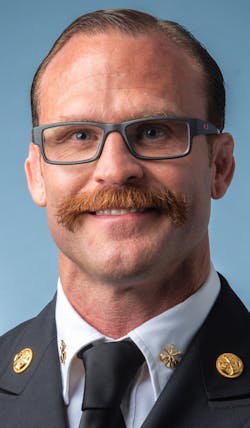Leadership Lessons: Repeated Exposure to Trauma
Continuing with my previous article regarding my wife’s letter to me in 2010, “When We Hurt, They Hurt” (firehouse.com/12381228), I would like to focus this month on firefighters’ repeated exposure to trauma (RET). According to Jahnke, Poston, Haddock and Murphy (2016), RET is the cumulative effect of caring for wounded victims, either physically or emotionally. The continual response and care for wounded victims is thought to have a psychological effect on the mental health of firefighters.
If we consider the number of calls we run and the effects of this RET, one can understand why mental health is finally becoming an important conversation for firefighters. Yes, firefighters are responding to fewer fires around the country, but emergency medical responses are increasing on a daily basis. Therefore, we’re witnessing more and more traumatizing incidents that many of us are not prepared to handle in a healthy manner.
Ask the right questions
So how do we start the conversation after a difficult response? The engine I ride responds to continual trauma, whether it’s shootings, stabbings, rapes, suicides, overdoses, motor vehicle accidents, motorcycle accidents or structure fires. With these experiences comes the understanding of how to interact with your firefighters. Some people like to use humor to ease what they just saw, some like to be silent, and some don’t mention the call at all. I try to utilize all these techniques depending on the personalities of the firefighters and the seriousness of the call. Here are a few examples of what has worked for me in the past when trying to start the conversation following a difficult or emotional call in order to assess the crew’s mental response.
First things first, I must check my own emotions to understand how I’m feeling. If I can’t process what I just experienced, the crew is more than likely having the same problem. I use the following questions on almost all responses to ensure that we, as a crew, are used to the process. If we make it a staple in our responses, the crew is already trained and ready to go through the process. This allows for consistency and continuity so when these questions are asked after a major emotional incident, the crew is not learning something new. As such, introduce this process on smaller incidents before using it on a major one. Here is the process I utilize. First, I begin with a few simple questions:
- “Everybody good?” This question is just to get a pulse of the crew and what they’re thinking. I can usually tell by the inflection in their voices if they’re actually “good” or if they’re just trying to hide it. It’s a simple question that yields major dividends in understanding your crew.
- “What did we do well on the call?” This is to allow the crew to focus more on the response side rather than the emotional side. This will create dialogue regarding how well we worked together on the operational side. This question is essential because, in my experiences with my crew, they like to talk about operations more than emotions. Therefore, focus on the operations and the mental conversation may develop from there. If we can just get the crew communicating rather than shutting down, that’s an important step.
- “What did we not do so well?” This allows the crew to discuss our deficiencies on the call and what we can improve upon for the next response. This also assists in mental recovery because the crew is now trying to learn from what they experienced and improve for the future. This may alleviate some of the exposure to trauma because the firefighters realize that they are going to be better because of what they experienced. This is a major step not only in operations but also mental health.
- “Anyone need peer support?” I have never had anyone take me up on this, but I always offer it because we have a great peer support program in our organization. It’s important to keep this avenue of communication open because the peer support team is trained to help firefighters following stressful responses. If we don’t utilize it, then what’s the point of having the program. It’s not for looks; it’s for use.
Now, do these questions always work or are they always appropriate? No. Sometimes the call is so severe that we need to allow our crews to process what they experienced before we can begin discussing. There have been times when I haven’t said a word until we get back to the station because I want the crew to reflect on their operations and emotional response, which I believe to be healthy in its own way.
Why it matters
If we don’t utilize techniques to help our crews, eventually someone will be impacted by a call to the point where we don’t know what to do. Let’s put this into perspective so we understand the importance of mental health. According to Jahnke, Poston, Haddock, and Murphy (2016), firefighters and EMS personnel have higher rates of depression than the general population, firefighters use alcohol and binge drink more compared to the general population, and firefighters suffer from irritability, desensitization, flashbacks and cynicism. Furthermore, due to firefighter’s continual exposure to trauma, they are more likely to develop psychological symptoms from a host of traumatic events, rather than a single response. This is alarming when thinking about the mental health of those who save others.
Get ahead of the game
The moral of the story: If you don’t have a departmental mental health program, you need one. Now! Unfortunately, we are on the reactive side when we discus items following an event. Let’s get ahead of the game and perform mental health education in recruit school, officer development programs, and promotional processes. If we can do this, the conversation will become natural and lives will be saved. We never know what someone is experiencing inside their minds, so we must have programs and techniques in place to access this. It is our duty to take care of our personnel physically and mentally. Sadly enough, we often forget about the mental side. Please don’t ignore this critical element of our jobs because someone out there needs help. Start with real talk. Stop hiding from it and do something about it or we have no one to blame but ourselves.
Reference
Jahnke, SA, Poston, WS, Haddock, CK, Murphy, B. 2016. “Firefighting and mental health: Experiences of repeated exposure to trauma.” Work, 53(4), 737–744. Doi:10.3233/wor-162255.
About the Author

Dr. David Griffin
Dr. David Griffin is the assistant chief of administration in Charleston, SC, and is a Firehouse Contributing Editor He was the operator of the first-due engine on June 18, 2007, when nine of his fellow firefighters perished. Griffin has come through the ranks in operations in every uniformed position, from firefighter to battalion chief and shift commander to his current position, during his 20-year career in Charleston. He has a bachelor's degree in education from The Citadel, a master's degree in executive fire service leadership, and a doctorate of education in organizational leadership and development. Griffin is the author of "In Honor of The Charleston 9: A Study of Change Following Tragedy," among three other books. He is an international speaker and instructor, a certified Chief Fire Officer and Chief Training Officer with The Center for Public Safety Excellence, an IFSAC/Pro Board-certified Fire Officer IV and a graduate of the Executive Fire Officer Program from the National Fire Academy. He is a graduate of Harvard University's Kennedy School of Executive Education program: Senior Executives in State and Local Government and of the Psychology of Leadership program at Cornell University's SC Johnson College of Business. Griffin is the owner of On A Mission, LLC, at drdavidgriffin.com.
